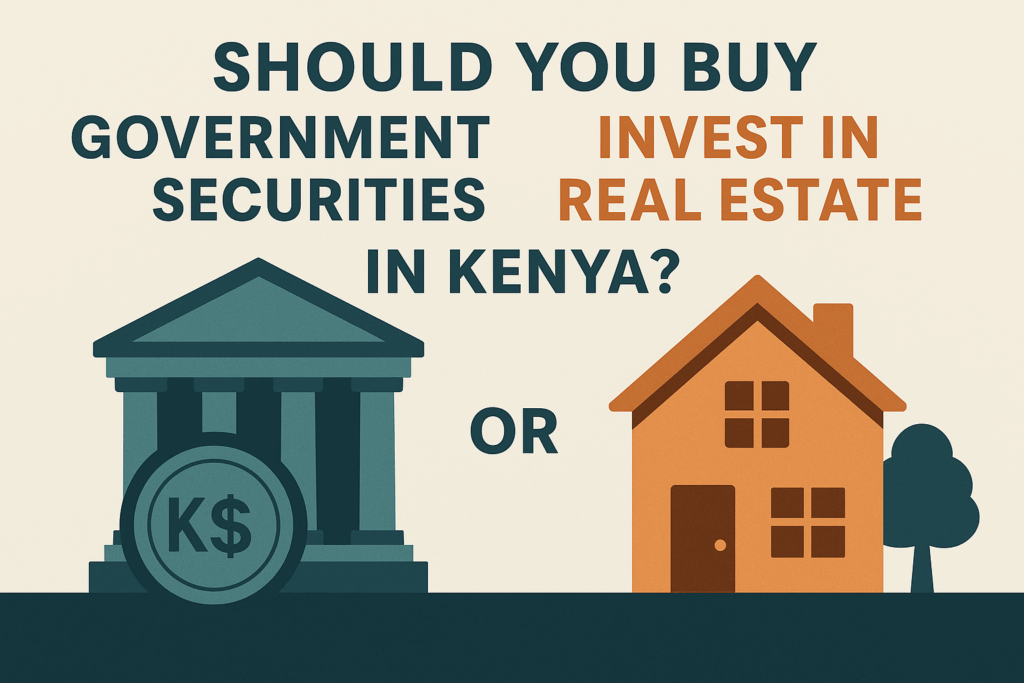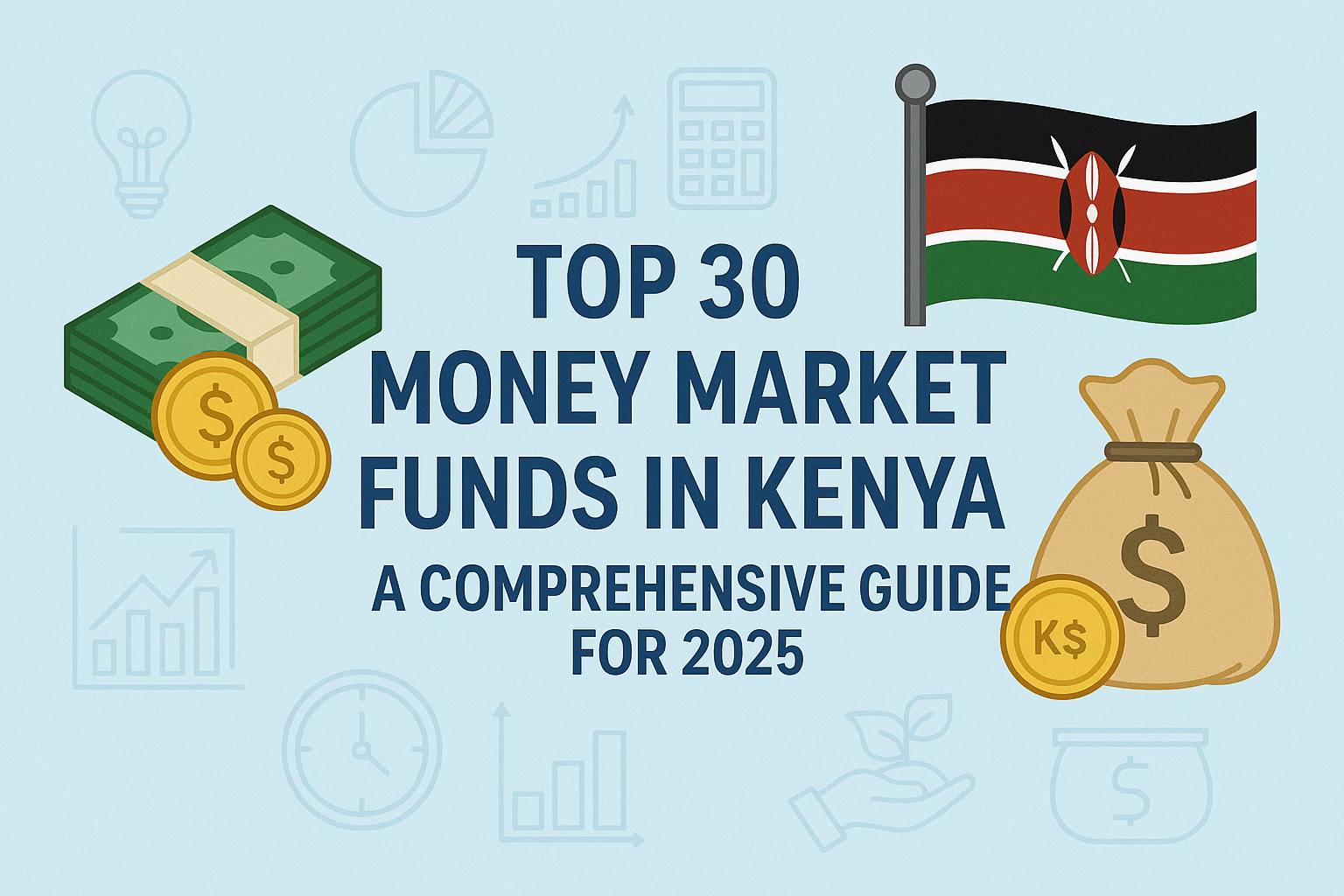One of the perennial dilemmas for Kenyan investors is: “Should I park my capital in government securities like bonds or in real estate?” Both have appeal, both carry risks, and both have distinct cash‐flow and capital appreciation dynamics. The right choice depends on your goals, risk tolerance, time horizon, liquidity needs, and ability to manage real assets.
In this article, I’ll:
- Lay out the features, risks, returns, and mechanics of government securities in Kenya.
- Do the same for real estate (land, rental property, development).
- Compare them head-to-head (total return, liquidity, risk, leverage, tax, operational burden).
- Offer a decision framework: when one might be more appropriate than the other.
- Some hybrid or blended options (diversification).
- Caveats and concluding thoughts.
Government Securities in Kenya: What, How, Pros & Cons
What are government securities?
In Kenya, “government securities” broadly means debt instruments issued by the government (via the Central Bank of Kenya, Treasury) to raise funds. These take the form of:
- Treasury Bills (short-term, usually less than one year).
- Treasury Bonds (fixed coupon, medium to long term, e.g. 5, 10, 15, 20, 25 years).
- Infrastructure Bonds (a subtype of longer term bonds, often tax‐favored).
- Other debt instruments or reopening of older bonds.
These securities often pay periodic interest (coupon payments) and return the principal at maturity.
For example, the government recently reopened fixed coupon Treasury bonds FXD1/2018/020 (remaining ~12.8 years, coupon ~13.2%) and FXD1/2018/025 (remaining ~18 years, coupon ~13.4%) with minimum investment of KSh 50,000.
The government also periodically offers infrastructure bonds and longer-term fixed coupon bonds.
Pros (Advantages) of government securities
- Relative safety / low credit risk
Because these are obligations of the sovereign, the risk of default is viewed as low (though not nonexistent). - Predictable cash flows
You know in advance the coupon rate and payment schedule (every 6 months, etc.). - Liquidity (secondary market)
Some bonds are tradable in secondary markets, so you can sell before maturity. - Low operational burden
You don’t have to manage tenants, repairs, property taxes, leasing, or physical maintenance. - Tax benefits (in some cases)
Some infrastructure bonds are tax‐exempt on interest. - Transparency and governance
Terms, coupon rates, and issuance schedules are public. - Low transaction costs
Buying or selling bonds is cheaper compared to property transactions. - Portfolio stabilizer
Bonds often act as a defensive hedge in downturns.
Cons (Disadvantages / Risks) of government securities
- Inflation risk
Returns can be eroded by inflation since coupons are nominal. - Interest rate risk
If interest rates rise, bond values fall (especially long-tenor bonds). - Fixed principal
You get back the nominal principal, not inflation-adjusted. - Opportunity cost
You might miss out on higher-growth assets like property. - Lower growth potential
Bonds rarely appreciate significantly. - Liquidity constraints
Some bonds are not actively traded. - Reinvestment risk
Coupons must be reinvested, often at lower rates.
Real-life numbers / comparisons
A comparative example:
- Investment of KSh 7 million in a Nairobi apartment earning rent of ~KSh 50,000 per month (KSh 600,000 annually).
- After costs and taxes, net rental yield ~6.8 %.
- Rent assumed to grow ~6 % annually, property appreciating at ~4 %.
- On the bond side, assuming a coupon of 13 %, the bond cash flows sum to more than the rental earnings over time.
- However, the real estate appreciates in value while the bond principal does not.
Real Estate in Kenya: What, How, Pros & Cons
Appeal in Kenya
Real estate is prestigious in Kenya as a store of wealth. Land especially has been a hedge against inflation, while housing demand continues to outpace supply (Kenya needs ~250,000 housing units annually but delivers only ~50,000).
However, some prime areas of Nairobi (e.g. Kilimani, Kileleshwa) have oversupply in luxury housing, pushing down occupancy rates.
Pros (Advantages) of real estate
- Capital appreciation
Land and property values often rise with urban expansion. - Dual return: rent + appreciation
You can earn rental income and property value growth. - Leverage
Mortgages or construction loans can amplify returns. - Tangible asset
Physical assets provide psychological comfort. - Value-add potential
Renovations and upgrades can boost returns. - Inflation hedge
Rents and values generally rise with inflation. - Tax incentives
Some allowances or depreciation benefits may apply. - Utility
Properties can also serve personal or business use.
Cons (Disadvantages / Risks) of real estate
- Illiquidity
Buying and selling property is slow and costly. - Operational burden
Managing tenants, repairs, and disputes is demanding. - Vacancy risk
Properties may stay empty or tenants may default. - Maintenance costs
Repairs and upkeep reduce net returns. - Regulation and zoning risk
Changes in laws can affect value. - Location risk
Property values are highly location dependent. - Debt risk
Rising interest rates can strain mortgage repayments. - High taxes and levies
Stamp duty, property taxes, and municipal rates reduce returns. - Expertise needed
Success depends on deep knowledge of the market. - Market cycles
Real estate can stagnate or drop in downturns.
Head-to-Head Comparison
| Feature | Government Securities | Real Estate |
|---|---|---|
| Return | Yields of 12–14% typical | Rental yields 6–9% + appreciation |
| Real return | Vulnerable to inflation | Better inflation protection |
| Liquidity | Secondary market exit | Illiquid, slow sales |
| Costs | Low | High (stamp duty, legal fees) |
| Management | Minimal | High (repairs, tenants) |
| Leverage | Rare | Common (mortgages, loans) |
| Risk | Lower, but rate sensitive | Higher, market cycles |
| Control | None | High (renovate, improve) |
| Diversification | Good stabilizer | Concentrated, location-dependent |
| Barrier to entry | KSh 50,000+ | Millions of shillings |
| Downside | Inflation erodes value | Vacancy, depreciation, high costs |
Decision Framework
- Goals: If you want income and stability, choose bonds. For growth and asset building, lean toward real estate.
- Capital: Small capital suits bonds; larger capital suits property.
- Risk tolerance: Bonds for the risk-averse, real estate for those who can manage risk.
- Liquidity: Bonds win if you need quick access.
- Diversification: Blend both for balance.
Hybrid Approaches
- Core and satellite: Bonds for stability, property for growth.
- REITs: Indirect property exposure with more liquidity.
- Bond ladders: Spread maturity dates to manage risk.
- Diversified property: Invest in different locations and property types.
Practical Tips for Kenyan Investors
- Minimum for bonds is relatively low (KSh 50,000).
- Monitor inflation and interest rates closely.
- Choose property in areas with strong infrastructure and demand.
- Budget for major repairs and vacancies.
- Verify titles and compliance before purchase.
- Always plan your exit.
Conclusion
There is no universal “better” option.
- For stable income and low hassle, government securities are ideal.
- For capital appreciation and inflation protection, real estate is attractive (if well managed).
- For many investors, the best solution is a mix of both: bonds as a safe foundation, real estate as a growth driver.
FAQs on Government Securities vs Real Estate in Kenya
1. Which is safer between government securities and real estate?
Government securities are generally safer because they are backed by the government. While there is some credit and inflation risk, they are considered low risk compared to real estate, which comes with market cycles, tenant issues, and high management needs. Real estate can, however, provide long-term appreciation if chosen wisely.
2. What is the minimum amount needed to invest in government securities in Kenya?
The Central Bank of Kenya allows individuals to invest in Treasury bills and bonds with as little as KSh 50,000 for most offers. This makes government securities more accessible for small and medium investors compared to real estate, which often requires millions.
3. Which has better returns in Kenya, real estate or government bonds?
It depends on your goals and assumptions. Government bonds currently yield around 12–14% annually, offering predictable cash flows. Real estate typically gives 6–9% rental yields, plus property value appreciation over time. With good location and management, real estate can outpace bonds in the long run, but it also carries higher risks.
4. Is real estate in Nairobi still profitable?
Yes, but profitability depends on location and property type. Prime areas like Kilimani have oversupply issues, affecting rental yields. Emerging neighborhoods and areas near new infrastructure projects often offer better appreciation potential. Due diligence is crucial before buying.
5. Can I combine both investments?
Absolutely. Many investors in Kenya hold both bonds and real estate. Bonds provide liquidity and stable income, while real estate offers long-term growth and inflation protection. A hybrid approach balances safety and opportunity.



